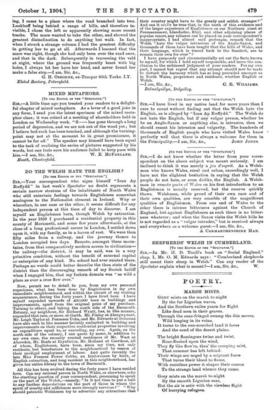[To TIM EDITOR OF THE "SPECTATOR." J
Sin,—Your correspondent who signs himself "loan Ap Ruflydd " in last week's Spectator no doubt represents a certain narrow stratum of the inhabitants of North Wales who still entertain feelings towards Englishmen somewhat analogous to the Nationalist element in Ireland. Why or wherefore, in one case or the other, it seems difficult for any independent person at this time of day to discover. I am myself an Englishman born, though Welsh by extraction. In the year 1859 I purchased a residential property in this county of Merioneth, and some few years afterwards, at the close of a long professional career in London, I settled down upon it, with my family, as in a haven of rest. We were then fifty miles from a railway, and the journey thence to London occupied two days. Remote, amongst these moun- tains, from that comparatively modern access to civilisation— the railway—the district, it may be said, was in a very primitive condition, without the benefit of external capital or enterprise of any kind. No school had ever existed there. Perhaps no words could better describe the then state of the district than the discouraging remark of my Scotch bailiff when I engaged him, that my forlorn domain was "as wild a
place as ever a crae flew over."
Now, permit me to detail to you, from my own personal experience, what has been done by Englishmen in my own immediate neighbourhood, and within the circuit of my visiting acquaintance, during the forty years I have lived here. I have myself expended upwards of £20,000 here in buildings and improvements, apart from the original price of my purchase. Turning to others, and taking the south side of the Barmouth Estuary, my neighbour, Sir Richard Wyatt, has, in like manner, expended that sum, or more, at Garth. Mr. Finlay at Abergwynant, Mr. Leigh Taylor at Penmaen Ucha, and Mr. Edwards at Dolserau have also each in like manner lavishly embarked in building and improvements on their respective residential properties involving an expenditure equal to, or exceeding, my own. Again, on the north side of the estuary, I can quote by name, in addition to my own case, the recently erected residences of Mr. West at Abereden, Mr. Beale at J3ryntirion, Mr. Holland at Caerdeon, all of whom, Englishmen, have been, since my time, not only residents, but benefactors to the neighbourhood by reason of their prodigal employment of labour. And quite recently the late Miss Frances Power Cobbe, an Irishwoman by birth, of English extraction, and long resident in this neighbourhood, has given her entire library to the town of Barmouth.
All this has been evolved during the forty years I have resided here. Can any rational person in North Wales, or elsewhere, echo the startling question of your correspondent, presuming to speak on the part of the Welsh,—namely, "Is it not time to put a halt to any further depredations on the part of those in whom the spirit of cruelty and selfishness more strongly survives ? " " Why should patriotic Welshmen try to advertise any attractions that their country might have to the greedy and selfish stranger?" And can it rer.11y be true that, in the teeth of this evidence and of the larger experience of Englishmen on our Northern coast at Penmaenmawr, Llandudno, Rhyl, and other adjoining places of popular resort, any reliance can be placed on your correspondent's inappropriate, I had almost said grotesque, remark that the Welsh "hate the vulgar intrusions of the Anglo-Saxon, and thousands of them have been taught that the hills of Wales, and their language, which is traced back to the Sanskrit, are to remain their own for ever " ?
I have purposely and circumstantially set out the facts known to myself, for which I hold myself responsible, and leave the con- clusion to the unbiassed judgment of your readers. For my own part, I cannot but regret that any attempt should now be made to disturb the harmony which has so long prevailed amongst us in North Wales, proprietors and residents, whether English or Welsh.






















































 Previous page
Previous page